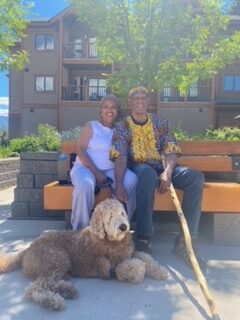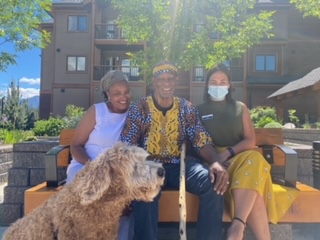After all of these years, Jane’s husband Richard still makes her laugh. She not only loves him, she says, but also really likes him.
“He’s a big, gentle man,” says Jane. “I like to be around him. He’s a good guy.”
Richard is a former professional football player, and at seventy-one-years-old is exuberantly active, especially with his sit-ups and workout routine.
Jane and Richard have been living at Origin at Spring Creek since last spring when they moved from Toronto to Canmore to be in a setting where Jane could receive respite care for Richard, who also has dementia. Up until March this year, they were residing together in a suite at MorningStar House, the memory care unit at Origin. Today, Jane is renting one of Origin’s Comfort Suites and visits overnight with Richard on Sundays.

Their story is unique, as Life Enrichment Educator Zoe Robinson says, “because we’ve never had a spouse that didn’t have dementia live on MorningStar with someone who did have dementia.” The transition from living with Richard to creating a space of her own was part of their customized plan at Origin, which has evolved to adapt to Jane’s needs as a caretaker, and Richard’s.
Respite Care at Origin at Spring Creek
Back when Jane was seeking respite and memory care, she was acting with a sense of impending urgency.
“Something told me that it would be a good idea to get into a safe place before my husband’s disease progressed because then I would have to scramble,” she says.
Canmore was an easy choice in part because of its proximity to Calgary, where their daughter and her young family live.
MorningStar at Origin also allowed her and Richard to stay together. “I don’t think I’d find a lot of places anywhere where I could do that, so that was another thing that made it really attractive, is that we could stay together and the rooms are a decent size so when we were together it wasn’t overcrowded, and you walk out the door and you’re in the mountains,” says Jane.
“As I say it out loud now, it makes me a little emotional because it helped a lot with the transition as his illness progressed. I was able to stay with him in the room, live with him; we lived together. So it was pretty special to be able to do that.”
Zoe says that respite care at Origin takes on many forms – whether that’s structured or unstructured – but ultimately it comes down to having people in the caretaker’s life who know and understand dementia and who can provide knowledge about the disease process.

“[Dementia] really places a caregiver in this open state of grief because caregivers are existing in this bubble of ‘I have someone I love and like still with me, and I treasure that, but I’m already grieving what I’ve lost, and parts of them are gone already’,” she says.
Living at Origin has given Jane the opportunity to build supportive bonds, not only with knowledgeable staff like Zoe but with new friends she has made in the Spring Creek community.
“One [friend] lives in the condos behind Origin, and one is across the street in the deli grocery store. They have been very supportive of looking after my dog when I need it, and they happen to also be just nice friends, nice people,” says Jane.
With Richard’s care in place, Jane has the space to go and “invest in the things that fill her up,” as Zoe says.
“Respite care gives caregivers the ability to do the things they love to do; see people they love, see grandbabies, get exercise, see friends. They can go to eat good food, where they don’t have to worry about anything,” she adds.
Jane has also found relief in Origin’s Companionship Program, which provides individualized one-on-one time for residents with a trained member of the companionship staff.
“It’s a really good help for me and the companions are very compassionate, although I will say they need a man in there. They’re all women and they need a man!”

Support For Caregiver Transitions & New Emotions
Feelings of stress and guilt are common for those in caregiving roles, especially when support is not sufficient. But for Jane, a sense of guilt didn’t come until after she had transitioned away from living with Richard, when the challenges of his care were almost entirely lifted from her day-to-day life.
While it was clear it was time to create space, both for her wellness and his, the emotional and physical distance of being a few floors away still weighs heavily on her.
“I’ve found that our visits are so nice and we both enjoy them so much that when it’s time for me to leave I don’t really want to leave, and he doesn’t want me to leave, but I know that I have to because in amongst all of that niceness I do get glimpses of why it was I needed to leave in the first place,” she says.
Zoe has been helping Jane process the “bittersweetness” of seeing Richard flourish in his new schedule and routine while knowing that she is not as involved in those areas of his life as she used to be.
“There you go with Origin again [whose team] has worked with me throughout this situation so my transition, if I think about it, has been with minimal stress,” says Jane.
“It’s been stressful, yes, but with all of the support I have had, it really has taken a lot of stress away.”
Another transition is starting for Jane, who plans to move in with her daughter in Calgary. She has already started easing into that change, spending much of the week there and returning to Origin for weekends. Her journey has chapters that have yet to unfold. But for now, she gets to enjoy her Sundays being around her kind, gentle, and very likable husband Richard.
The one who makes her laugh.




